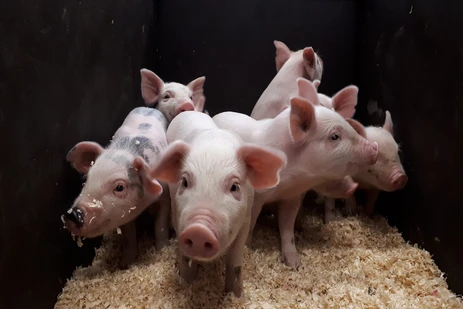Forschung


In the next decades, humanity will have to find an answer to the enormous challenge to “feed the world” (as defined by the FAO), caused by the fast-growing world population and its increasing wealth. The global consumption of animal protein will likely double by 2050. A considerable part of the increased food demand will be answered by chicken products (both eggs and meat).
Chickens have the lowest greenhouse gas production of all terrestrial livestock species, and in addition have an exceptionally good feed conversion ratio. This makes chickens a relatively environmental-friendly and also a financial-rewarding livestock animal. However, modern chicken production has a high risk for disease spreading: chickens are housed in chicken houses at high stocking density and preventive use of antibiotics is undesirable.
Thus, the main interest of our chair of Reproductive Biotechnology is focused on understanding the chicken immune system to equip the chicken with better tools to fight of diseases. We are one of the very few groups worldwide with the skill set to develop and utilise genetically engineered chickens for use in immunological research.
The chicken immune system
Our core business is the generation of genetically modified chickens to elucidate the unique features of the innate and adaptive immune systems in chickens.
Adaptive immune system
The absence of B and T cell knockout chickens has been a persistent obstacle for chicken immunologists for decades. However, we have successfully generated B and T cell knockout chickens. These chickens are an essential tool to understand the unique features of the chicken adaptive immune system and to utilize this knowledge to improve the chicken’s disease resistance.
Innate immune response
Comparative studies difference between chicken and duck clearly illustrates a remarkable difference in viral susceptibility. Comparison of the genome of both species led us to the identification of specific innate immunity-genes that are evolutionary lost in the chicken. We restored these lost genes in the chicken genome to investigate their effect on the chicken’s (anti-viral) immune response and to use this knowledge to improve their innate immune system.
In addition we introduce precise edits into the chicken interferon system in order to analyze the role of interferon in the avian innate immune respsonse against pathogens.
Genetic engineering of chickens
The chicken offers a great opportunity to study mechanisms that regulate development. Its phylogenetically distance from mammals gives the chicken substantial advantages to this, such as easy access to the embryo. The culture and genetic modification of primordial germ cells made it possible to introduce specific gene mutations into the germline. We have and are generating several lines of transgenic chickens, such as the B and T cell knockout chickens, in order to study different physiological functions. Our primary focus is, as mentioned, the chicken immune system. However, we also use our knowledge on genetic engineering to collaborate on other societal-relevant issues, such as understanding sex development in chickens to prevent culling of one-day-old male chickens.
Chicken models for biomedical research
Our chair created Cas9 endonuclease-expressing chickens, which is our newest revolutionary tool to facilitate gene editing in chickens. This fascinating model offers an easy and fast way to manipulate the chicken genome by simple delivery of single guide RNAs (sgRNA). The rapid genome editing allows easy physiological studies of specific genes, as well as direct comparison of gene functions between chicken and mammalian species. This created an unprecedented opportunity for different research fields, such as evolutionary biology. Furthermore, we use our expertise to create chicken models for biomedical research for human diseases, such as cancer. Moreover, this reduces the number of experimental animals necessary for the screening and development of therapeutic agents for such diseases.
Large Animal Models for Translational Research
In addition to our focus on chickens in agriculture and immunology, we also work with pigs as advanced biomedical models. Their close physiological and anatomical similarity to humans makes them invaluable for studying human diseases and developing translational approaches.
Pig models for biomedical research
Large animals, particularly pigs, provide an invaluable complementary resource for research that aims to bridge the gap between basic science and the clinic. Their size, anatomy, and physiology make them far closer to humans than rodents, and thus a powerful platform for modeling human disease.
Our group is replicating key human genetic lesions in pigs to create clinically relevant cancer models. For example, we generated pigs carrying the nonsense mutation APC1311, orthologous to a human mutation that causes familial adenomatous polyposis (FAP). These pigs develop adenomatous polyps in the colon, closely mirroring early-stage human FAP.
We have also developed pigs carrying latent, Cre-inducible oncogenic mutations such as KRAS and TP53. Depending on how and where Cre is delivered, these models can give rise to a range of cancers, including pancreatic ductal adenocarcinoma (PDAC). This strategy allows us to study tumor development in a controlled and clinically relevant way.
Together, these porcine cancer models represent a powerful resource for preclinical research — from dissecting tumor biology to identifying novel biomarkers and evaluating new diagnostic or therapeutic strategies. By closely mirroring human disease, they help to bridge the gap between preclinical studies and clinical trials.
Cutting-edge technologies
To advance both poultry and pig research, we employ state-of-the-art technologies, including CRISPR/Cas9 genome editing, site-specific recombination for conditional gene expression, and organoid systems for modelling immune responses and disease. We also use virus-like particles (VLPs) as versatile delivery tools: VLP–Cre for local gene activation and VLP–gRNAs for targeted gene inactivation. Together, these approaches enable the creation of precise animal models that drive progress in agriculture, animal health, and biomedicine.
This is in a nutshell the work we do at the chair of Reproductive Biotechnology. We are always looking for new opportunities and collaborations. Feel free to contact us!